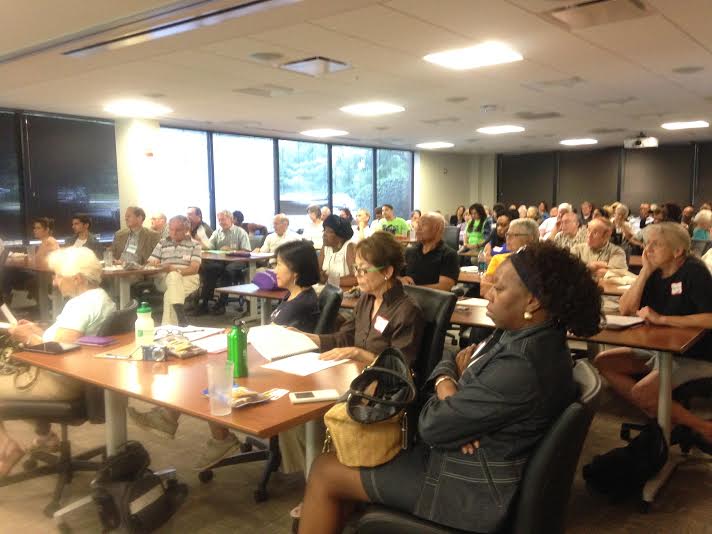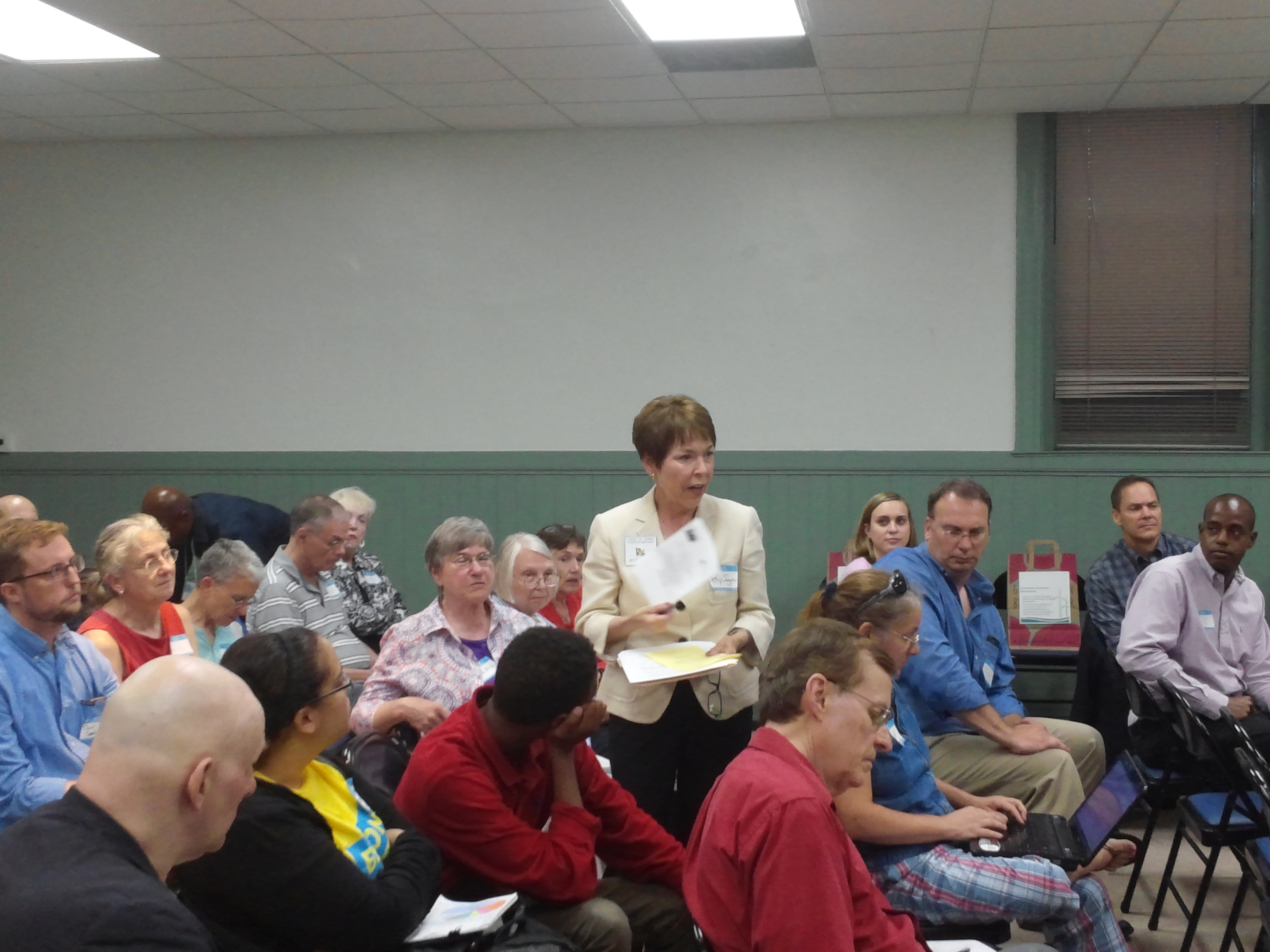In the past eight weeks, over 200 Marylanders attended and testified before the Maryland Climate Commission. The Maryland Climate Commission held listening sessions across the state to report on the progress of Maryland’s Climate Action Plan and also to learn how people across the state want to address climate change in their communities.
Maryland’s Climate Action Plan was borne out of the 2009 passage of the Greenhouse Gas Reduction Act (GGRA), which created over 150 programs and policies designed to cut our state’s greenhouse gas emissions by 25% by 2020. This GGRA law must be renewed in 2016. Without action from the Maryland General Assembly, the state will lose its legal mandate to cut greenhouse emissions and implement the programs that will protect Maryland for generations to come. CCAN is mobilizing activists to call on our state legislators to renew and strengthen the GGRA. One of the most critical ways we can strengthen our plan to reduce greenhouse gas emissions — and the top recommendation in Maryland’s Climate Action Plan — is to increase the state’s clean energy standard to 25% by 2020.
The climate commission could have walked away empty handed, without any input from everyday citizens – yet you made sure that didn’t happen. Across the state, climate activist, labor, faith and elected leaders spoke out with one clear message: Maryland must do more and can do more to address climate change in our state. This was a critical step in ensuring that Maryland’s Climate Action Plan is renewed. The Climate Commission, along with the Maryland Department of Energy, will be issuing a report to the Hogan administration and our state legislators this fall to help shape Maryland’s next steps.
The first meeting was held in Baltimore City in a small library meeting room. City Councilman Jim Kraft decried Governor Larry Hogan’s nixing of the funding for the red line and the lack of opportunities for economically down-trodden Baltimore to be a transit-oriented community. He was joined by Cheryl Arney, who held up a picture of her granddaughter along with a report predicting the rising sea levels along Maryland’s coast line and talked about the price of inaction. Representatives from Fuel Fund spoke out about how weatherization and improving the energy efficiency of low and moderate income households would have a lasting impact on our climate. Funds for these weatherization projects are possible due to programs outlined in the Greenhouse Gas Reduction Act and Maryland’s Climate Action Plan.
On the Eastern Shore, a small group of dedicated activists championed strengthening Maryland’s Greenhouse Gas Reduction Act and increasing Maryland’s clean energy standard.
In Western Maryland, Engage Mountain Maryland, local elected officials and Senator Roger Manno showed up to have their voices heard. Members of Engage Mountain Maryland spoke of their opposition to fracking and declared that it should not be a component in any climate action plan due to the unknown health and environmental risks. They also shared studies that show the emissions from fracked gas worsens climate change and is far worse than coal for the climate. Senator Manno decried Governor Larry Hogan’s refusal to publish the new rules on coal fired power plants. Local residents spoke of their love for the landscape of Western Maryland and how they feared that fracking would poison their communities.
In Southern Maryland, Cove Point activists spoke stridently against the export facility in Lusby and the impacts that it would have on their health. One activists spoke out and stated that if everyday citizens had to curb their pollution through vehicle emissions and other legal mandates, than coal power plants need to have mandates to curb their own pollution.
The climate commission listening sessions culminated in Prince George’s County. Delegate Dereck Davis pledged to rise above partisan politics and work to have the Greenhouse Gas Reduction Act passed through the House of Delegates. Delegate Joseline Pena-Melnyk, challenged everyone in the room to call, show up to hearings and ensure that their legislators felt grassroots pressure to pass the renewal of the GGRA and fight for clean energy policies. Over 96 people attended the Prince George’s County climate commission listening session, leaving an undeniable impression on the climate commission that citizens from across the state want to see Maryland be a leader in confronting the climate crisis.
To add to the flood of voices demanding that the Maryland Climate Commission work to strengthen and renew Maryland’s Climate Action Plan — submit your comment today!
Packed Room at Baltimore Kickoff for Statewide Climate Hearings
Cheryl Arney held up a picture of her granddaughter in a crowded room in the Patterson Park Library in Baltimore City. As she held up the photo of a young smiling girl she stated, “I am here because of her — this is her century and we must protect the Earth for her.” Cheryl was one of 21 people who testified in front of the Maryland Climate Commission.
The Maryland Climate Commission — a stakeholder group of government, industry, and nonprofits including Chesapeake Climate Action Network — are working to get public input on Maryland’s Climate Action Plan.
The Baltimore City meeting which took place on Tuesday, July 14th was the first in a series of public forums to be held on climate change. More than twenty activists and concerned citizens said they want to see more aggressive action to reduce greenhouse gas emissions and increase usage of clean, efficient energy in Maryland.
On November 15th, the commission will release a report to the General Assembly with recommendations about next steps for climate action in Maryland, and the purpose of these listening sessions is to help inform that report.
CCAN and our allies have been encouraging activists to attend these sessions, and this kickoff event was a great success! Leaders from the faith community, environmental groups, labor organizations, low-income advocates, and several concerned citizens packed the room and delivered a clear message to the commission. They said they want the state to stay on course to achieve the science-based carbon cuts required by the Maryland Greenhouse Gas Reduction Act of 2009. That law needs to be renewed in 2016 by the General Assembly. Many of those present said lawmakers should not only renew but also strengthen the landmark law.
Several activists also referred to the state’s clean electricity standard (the Renewable Portfolio Standard or RPS), saying it should be increased to at least a 25% by 2020 standard. With the RPS too, many activists urged the commission to consider going even beyond 25% by 2020. Many activists also addressed the importance of statewide energy efficiency measures, again encouraging decision makers to strengthen existing goals.
There are several other Commission hearings planned across the state:
- Frostburg – UMCES Appalachian Laboratory – 7/28, 6pm
- Avenue – All Saints Episcopal Parish Hall – 8/4, 6pm
- Largo – PG County Department of Environment Resources – 8/6, 6pm


